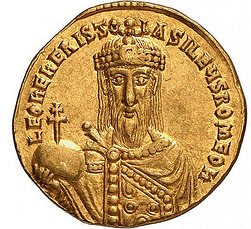Did the Armenians control Byzantium?
 Hovig asks how influential the Armenians were in the Byzantine Empire. The short answer is ‘very’.
Hovig asks how influential the Armenians were in the Byzantine Empire. The short answer is ‘very’.
Armenia provided some of Byzantium’s best soldiers (there were Armenian contingents fighting in Justinian’s armies), and some of its leading early generals (most famously Narses). The Byzantines- like the Romans- were always a heterogeneous people. What counted was not so much ethnic origin but culture. They would look down their noses if you dressed like a provincial or spoke with an accent, but inject a little schooling and your children could be mixing with the blue-bloods. The fact that Justin was a poor, uneducated peasant from the Balkans didn’t stop later emperors from claiming to be descended from his nephew Justinian, and the only reason the pathetic Zoë was allowed to rule as empress was because she was directly related to Basil I- a rough ‘hick’ from the country who murdered his way to the throne.
But to the Byzantines, Armenia marked the limits of civilization (ie Hellenism). There were parts of Armenia where Greek never displaced the native tongue, and it was the spot where classical Greco-Roman culture faded and Persian influences (and later Arab) began. Christianity exerted a pull toward Constantinople, but the Armenians were always fiercely independent people. They were so stubborn that one emperor (Maurice) got fed up with dealing with them and made an agreement with the Persian Shah to deport the entire population. Fortunately for Armenia the Shah didn’t follow through, but imperial policy for the next several centuries concentrated on deporting Armenians as a way to control troublesome spots, repopulate others, or to bolster military numbers. Courtesy of the imperial government Armenians were settled in Cyprus, Calabria, Sicily, Crete, North Africa, and Sparta.
In the 8th century, however, things began to change. The Arab advance had pushed the imperial army out of Armenia and a stream of refugees had come with it. An Armenian colony had already been founded in Pergamum and in 711 a member of the colony named Bardanes managed to overthrow the emperor and for two years reigned as the emperor Philippicus.
This first experiment in Armenian emperors was not successful (Philippicus was quickly overthrown and had to serve as his successor’s footstool in the Hippodrome), but it was soon followed by a better one. The Bulgars were raiding Thrace, and to protect Constantinople’s flank the emperor Leo IV settled a few thousand Armenians right in their path. So many were taken prisoner back to Macedonia that the Armenians remaining in Thrace were given the nickname ‘Macedonian’. In 867 one of them- a man named Basil- made his way to Constantinople and killed off the reigning emperor (who was actually half-Armenian himself). Basil founded a new dynasty (the so-called “Macedonian” Dynasty) which ruled for the next 190 years. During that time Armenians dominated the government. The important generals, administrators, governors, bureaucrats, and at least one major historian (Genesius) were all Armenian. Even the usurper Romanus Lecapenus who briefly elbowed aside the legitimate ‘Macedonian’ emperor was an Armenian. It was a period of brilliance in nearly every field, and it witnessed a renaissance of learning overseen by three of the most educated men Byzantium ever produced- the Patriarch Photius, John the Grammarian, and Leo the Philosopher- all Armenians.
Basil II- the last of the “Macedonian” emperors- did start an Armenian colony in Macedonia, but that turned out to be the apogee of both Armenian influence, and imperial strength. 46 years after Basil’s death a Turkish army engaged a Byzantine one in the little Armenian town of Manzikert and the disaster led to the permanent collapse of Byzantine power.
As a final postscript I should point out that terms like ‘Armenian’ and ‘Byzantine’ are a little anachronistic. Today we tend to think in terms of nationalities or states- the term ‘Armenian’ for instance is tied both to ethnic origin and a citizen of the country of Armenia. This was not the case a thousand years ago. There was no Armenia, just a collection of princes, a population sharing common dialects, and vague, shifting borders. As for the Byzantines, their identity was tied to culture, traditions, religion, and civilization. In other words, if you crossed yourself from right to left, dipped your bread in olive oil, and knew your Homer, than you qualified as a Roman.
If you had walked into the court of Basil II and asked him what he was, he would have given you the same answer as every one of his predecessors since Augustus. Roman.
Then knowing Basil, you’d have your eyes put out.